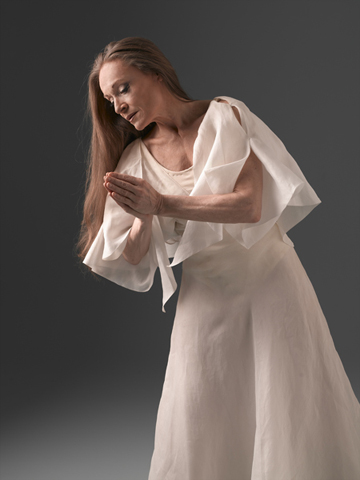|
 |
|
|
 |
 |
About the Author:
 Martha Graham Dance Company: Cave of the Heart, Primitive Mysteries, Appalachian SpringMartha Graham Dance Company
(Graham Company Website)
Martha Graham: Founder, Dancer, Choreographer
Terese Capucilli and Christine Dakin: Artistic Directors
Marvin Preston: Executive Director
Isamu Noguchi and Riccardo Hernandez: Scenery Design
Beverly Emmons, Jean Rosenthal, and Christopher Akerlind:
Lighting Design
Aaron Sherber: Music Director/Conductor
Kate Elliott: General Manager
David Pini: Company Manager
Melissa Caolo: Production Stage Manager
Beverly Emmons: Lighting Designer
Martha Graham, Oscar de la Renta, and Donna Zakowska:
Costume Design
General Strategic Marketing, Ltd.,
Jonathan Marder/Martha Thomases: Publicity
Guest Artist: Martha Clarke
Music Director/Conductor: Aaron Sherber
Guest Composer: Franco Piersanti
Presented at City Center
(City Center Website)
(See other Graham Company Interviews, Reviews and Photos)
Dr. Roberta E. Zlokower
April 7, 2005
Martha Graham, Founder, Dancer, and Choreographer of the Martha Graham Dance Company, was one of my greatest heroes. She and I actually shared the same birthday. She was a pioneer and a pillar of strength and encapsulated basic human emotions, especially those of female characters from the frontier and from mythology, drawing inspiration from friends who painted, sculpted, and composed 20th Century music. In 1988, Time Magazine named Martha Graham the Dancer of the Century. During her 70 years as a choreographer, Ms. Graham created 181 ballets and a Modern Dance technique that has been compared to ballet, due to its complexity and depth.
Martha Graham considered herself, first and foremost, a Dancer. I remember seeing her dance. She danced at a point of maturity, when many dancers have retired. Ms. Graham never retired, in my mind, and I recall her accepting Bravura audience acclaim, onstage, in her expansive, golden, Asian styled, Halston gowns. Her black hair was a severe as her dances. She continued to exude the same, studied presence and poise that have been recorded in photos and films of her earliest performances. Ms. Graham founded her dance company and school in 1926 in Carnegie Hall. In Ms. Graham's own words, "In all of us who perform there is an awareness of the smile which is part of the equipment, or gift, of the acrobat. We have all walked the high wire of circumstance at times. We recognize the gravity pull of the earth as he does. The smile is there because he is practicing living at the instant of danger. He does not choose to fall." (Company Notes).
Live Orchestra
Cave of the Heart (1946): Choreography and Costumes by Martha Graham, Music by Samuel Barber, Set by Isamu Noguchi, Original Lighting Design by Jean Rosenthal, Adapted by Beverly Emmons, Performed by Fang-Yi Sheu as Medea, Martin Lofsnes as Jason, Erica Dankmeyer as The Princess, and Katherine Crockett as The Chorus.
This psychological drama of a woman scorned by her husband, as he takes a younger woman, crazed to the point of murdering the husband, his lover, and finally her own two children, is the quintessential Greek tragedy that inspired many of Ms. Graham's psycho-physical modern dances and the quintessential role for her protégées. Ms. Sheu, as Medea, coiled like the human serpent she has become, writhing in angst, as she gazed upon the frolicking, unsuspecting Princess, perfectly portrayed by Ms. Dankmeyer, who places the poisoned crown upon her head. Mr. Lofsnes, as husband, Jason, exudes both positive passion in the presence of his Princess and negative passion in the presence of Medea. His death scene dance, after Medea drags the bound and deceased Princess onstage in a long cloth, is personalized and poignant. Ms. Crockett, as The Chorus, is always in a prescient persona.
Primitive Mysteries (1931): Choreography and Costumes by Martha Graham, music by Louis Horst, Lighting by Beverly Emmons (After Martha Graham), Performed by Christine Dakin and the Company. In this religious and spiritually based dance, Christine Dakin made a rare appearance as solo performer, with lovely, long, light hair flowing down a lovely, long, white dress, an amazing figure in the circle of female celebrants of an American Southwest, Catholic ritual, originally introduced to the region by Spanish conquerors. This Miracle Play, to a score by Ms. Graham's favorite composer, with palpable silences and percussive feet, found Ms. Dakin, also Artistic Director of the Company and a Graham protégée, in strong form and persuasive theatricality. Every stylistic "contraction/release", signature Graham, was performed by the Company in synchronized rhythm.

Martha Graham Dance Company - Primitive Mysteries - Christine Dakin (The Virgin)
Photo courtesy of John Deane
Appalachian Spring (1944): Choreography and Costumes by Martha Graham, Music by Aaron Copland, Set by Isamu Noguchi, original Lighting by Jean Rosenthal, Adapted by Beverly Emmons, Performed by Miki Orihara as The Bride, Tadej Brdnik as The Husbandman, Christophe Jeannot as The Revivalist, Heidi Stoeckley as The Pioneering Woman, and Jennifer DePalo-Rivera, Carrie Ellmore-Tallitsch, Yuko Suzuki, and Blakeley White-McGuire as The Followers. With The Followers looking on like a Greek Chorus, a bride, her "Husbandman", a wild Revivalist, and a Pioneering Woman, Copland's upbeat score took on a foreboding quality that depicted life in the American prairie. Ms. Orihara, The Bride, was stoic, exuding simplicity of style. Mr. Brdnik presented a muscular, welcoming husband, ever aware of Mr. Jeannot's Revivalist character, who seemed to be reeking of restrained physicality and artificial mores. Ms. Stoeckley, The Pioneering Woman, had the requisite sacrificial presence of the Old Western women, as did The Followers. This singular work visualizes a very singular American folk motif. Kudos to Martha Graham. Kudos to Martha Graham Dance Company 2005.
|
|
|



